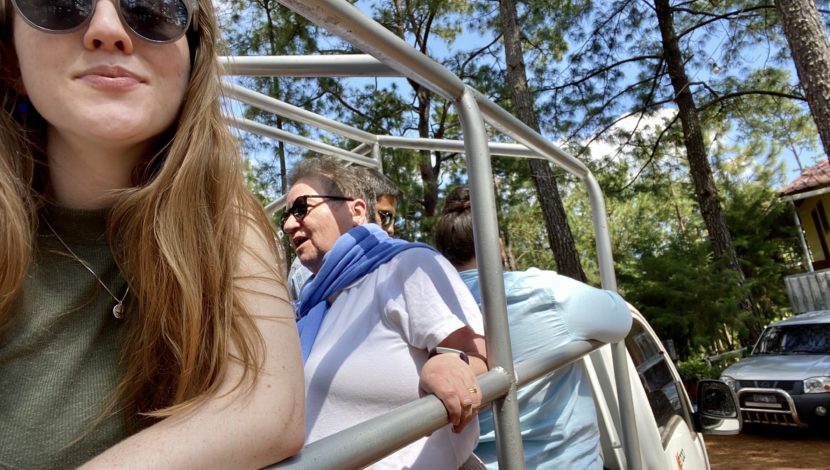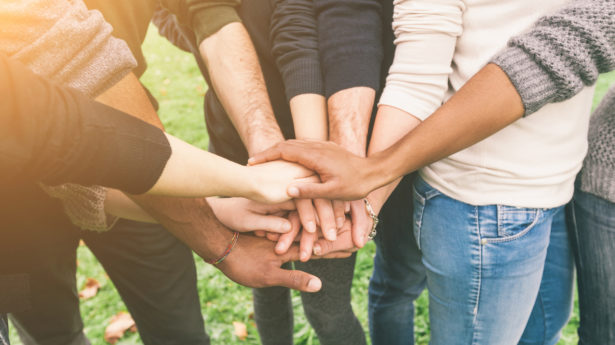The Unitarian Universalist Service Committee advances human rights through grassroots collaborations.
Building the World Anew: Growing Our Hearts in El Salvador

By Rose Gallogly on February 10, 2020
Rose Gallogly is a Unitarian Universalist who recently visited El Salvador with the UU College of Social Justice. She wrote about her experience and how it has impacted her social justice work.
For the past few years, I’ve been deeply involved in accompanying those most directly affected by our country’s immigration policies as part of the Boston Immigration Justice Accompaniment Network (BIJAN). Having been in relationship with so many Salvadorans and other Central Americans through that work, it felt right to sign up for the first UU College of Social Justice immersion program in El Salvador. I knew it would enrich and support my justice work here, even as I held the deep irony of the ease with which I was able to get on a plane to San Salvador, and then just as easily come back home.
I’ve been thinking a lot about what it means to hold the whole range of what’s going on: to take in the horrors and injustices of the world, yet not let them prevent me from also taking in and loving its many miracles. “Miracles despite it all” was the theme of BIJAN’s holiday party this year, and that’s what this work and world is, exactly.
As we drove from the airport into San Salvador, I took in the gorgeous landscape and felt incredibly grateful. I also kept thinking of the time over a year ago, studying this route into San Salvador on a map, when I supported an East Boston mother on the day of her son’s deportation. We were scrambling to find someone to pick him up from the airport he hadn’t seen since childhood. It gave me some comfort to think of him also having seen this beautiful landscape of his homeland. But it was comfort on top of heartbreak, some joy on top of a deep sadness for the world.
We learned so much all week—so much fascinating and troubling history, including the deep culpability of the U.S. government in the country’s continued pain and violence; so much about the factors driving migration and about the complexities of what they’re fighting for within the country. Beyond all of those learnings, the main spiritual lesson for me throughout the week was that theme of holding the whole range—and what it means to grow our capacity to fully feel our way into that.
The best illustration of that theme was held by our experience on Saturday, when we took a long bus ride to the village of El Mozote. This was the site of a massive massacre on December 11, 1981, when government forces came into this small rural town on official orders and killed more than 1,000 civilians in cold blood, over half of them children. No one has faced any accountability for this, and for decades the Salvadoran government has tried to completely deny that the killings ever even happened. Surviving family members are still locked in the struggle for full legal recognition and reparations for this horror, partially with the legal aid of Cristosal, our host organization.
One woman, who witnessed the massacre and whose list of lost family members felt endless, offered a bit of her story to us. At one point she said that the only psychologists she had back then were “God and the Mother,” and something about that struck me so deeply. Their tradition is not mine, but I feel sure that it is mine to learn how faith and love have held such horrors—I know we will need both to move forward.
It’s so hard to know how to hold something like this, as deep as my belief is in love and healing and regeneration. I can only share that this town, almost 40 years later, is not healed but is very much alive again: there were children running around everywhere, along with chickens and dogs, surrounded by trees and incredible flowers. One of the local youth spoke of his deep need to know the history of his people in order to move forward, and of using art as a tool for building this new future in joy. He said the horror of that day lives in his bones, and he insists still on knowing it, sharing it, and in love, creating the world anew. Before leaving, we spoke with a sweet little four-year-old girl in the town square whose smile made the world come alive for me again. She told us with a grin all about how she draws and paints in school. We will all, in love, learn to create the world anew.
Unitarian Universalism teaches that no one is outside of the circle of love—and that it is our task to continue to widen that circle. That has been a guiding principle for me. Maybe this thought of our hearts breaking from the world and then learning to heal and expand is an extension of the same metaphor: that of the circle of love containing all of us, and needing to grow wider and wider within ourselves.
During the long drive back to San Salvador, I took in the mountains that had been hugging us all week, and again, I felt my heart expand. To have our hearts big enough to take in those sacred mountains is to have hearts big enough to also take in the atrocities committed in their foothills. It is to commit to building the world anew, in love. To have a heart big enough to hold the range, the full range, is to have a heart willing and open to sharing it all.
Photo Credit: Rose Gallogly
***
About UUSC: Guided by the belief that all people have inherent worth and dignity, UUSC advances human rights globally by partnering with affected communities who are confronting injustice, mobilizing to challenge oppressive systems, and inspiring and sustaining spiritually grounded activism for justice. We invite you to join us in this journey toward realizing a better future!
